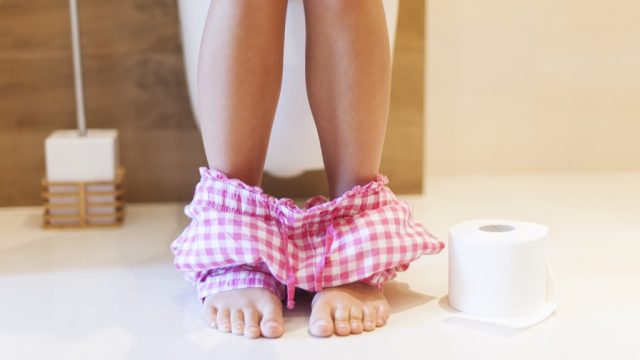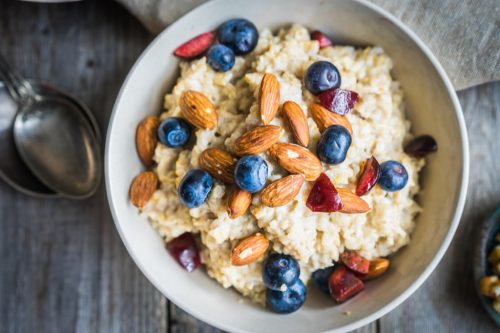5 Doctor-Recommended Ways to Stay Regular in the Bathroom
If you're having troubles with constipation, these tips can help.

If you've ever been, how shall we put it… backed up, then you know how uncomfortable it is. Besides the physical feelings of fullness, bloating, and sometimes actual pain, not going to the bathroom on a regular basis can leave you feeling short-tempered, sad, and generally out of sorts, thanks to the gut-brain connection that makes gastrointestinal issues affect our mood. And most people can probably relate to the feeling of relief and lightness that follows, once you're actually able to go. (Yes, we're talking about doing a number two here.)
The key to avoiding this discomfort is to help your body maintain a predictable pooping schedule—but how can you do that? We asked doctors for their best tips. Read on to find out what they had to say about staying regular.
READ THIS NEXT: Never Leave the Bathroom Stall Before Doing This, Doctors Warn.
1
Move your body.

Jeff Gladd, MD, chief medical officer at Fullscript, says that if you want to move your bowels, you've got to move your body. "Staying active can help improve or prevent constipation," he explains. "Research shows that aerobic exercise, such as walking and jogging, can provide some constipation relief. Furthermore, yoga and gentle stretching may offer some relief."
Gastroenterologist Kenneth Brown, MD, host of the Gut Check Project podcast, concurs. "Physical activity can help stimulate the muscles in your intestines and promote regular bowel movements," he tells Best Life.
2
Stay well hydrated.

There are plenty of great reasons to drink lots of water, but if you need one more, here you go. "Hydration is key, as dehydration can lead to hard, difficult-to-pass stools," Gladd says. "It's essential to stay hydrated throughout the day by drinking plenty of water and enjoying hydrating foods like fruits and vegetables."
How do you know if you're drinking enough water to keep everything moving smoothly? "How much water you need largely depends on your body size and activity level," Gladd tells Best Life. He also suggests taking a look next time you, ahem, take a leak.
"A good indicator of your hydration status is the color of your urine," Gladd continues. "If your urine is pale yellow, that's a clear sign that you're drinking enough water, whereas dark yellow urine suggests that you aren't adequately hydrated."
READ THIS NEXT: If This Happens to You in the Bathroom, Get Your Thyroid Checked, Doctors Warn.
3
Eat plenty of fiber.

You've probably heard this one before—maybe from your grandmother as she plunked a bowl of oatmeal in front of you at the breakfast table. But the reason it's oft-repeated is because it's true.
"Eating enough fiber is a top priority when it comes to promoting a healthy gut and preventing constipation," says Gladd. "If you're like most adults, you're likely not eating enough fiber. Men and women should consume at least 30 to 38 grams and 21 to 25 grams of fiber per day, respectively."
Mahmud Kara, MD, founder of KaraMD, offers suggestions on how to reach those goals: "You can increase your dietary fiber intake naturally through eating whole, organic foods that are high in fiber, such as beans, leafy green vegetables, whole grains, chickpeas, etc. I always recommend avoiding pre-packaged foods that state 'added fiber' or 'high fiber' on the label, as these often include something called 'functional fiber,' which is extracted from food and added later on in the manufacturing process," he says.
4
Take notes on your toilet habits.

Are you visiting the bathroom too often, rather than not enough? If you'd prefer to scroll your social media feeds from the comfort of your sofa instead of on the toilet, try training your body to go once a day, says nutritionist and bariatric specialist Karen Reyes.
"The great thing [about] bowel retraining is that it's actually very simple," she shares. "All you need to do is attempt to go for a poop at the same time every day."
Reyes recommends keeping a diary of what you eat and drink, and when, for a week. "If you have any gastrointestinal issues such as cramping, stomach pain or you haven't had a bowel movement for more than 48 hours consult with your doctor," she cautions. "Try to poop at [the same time] every day, even if you don't feel as if you need to. But don't strain, simply sit on the toilet and relax with your feet on a footstool for 10 minutes. If nothing happens, don't worry, just go the next time you feel the urge. Never try to hold it!"
One caveat? "Bowel retraining may not help if you do not eat three regular meals and drink eight or more glasses of liquid (preferably water or herbal tea) per day," Reyes says.
For more health advice sent straight to your inbox, sign up for our daily newsletter.
5
Try a supplement.

Are you eating your oatmeal, going for a daily brisk walk, drinking water, keeping a journal, and still not going to the bathroom regularly? It might be time for a trip to the doctor—but a stop at the drugstore might help too.
"When diet and exercise aren't enough, some supplements may help ease occasional constipation," says Gladd. "Probiotic supplements have been shown to increase stool consistency and frequency among individuals with constipation. Psyllium husk powder and inulin, a type of prebiotic fiber found naturally in some foods such as garlic, leeks, and asparagus, have also shown to be effective in improving stool frequency and consistency."





















